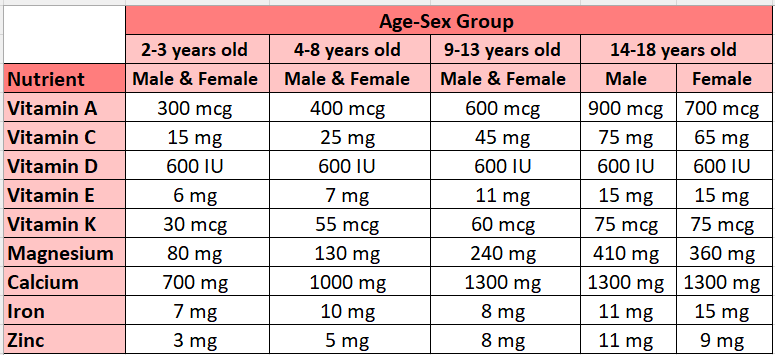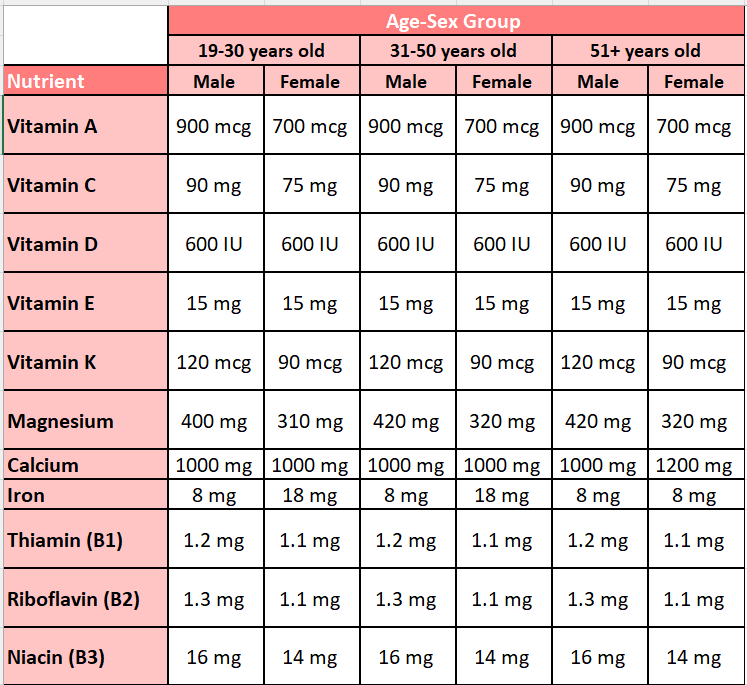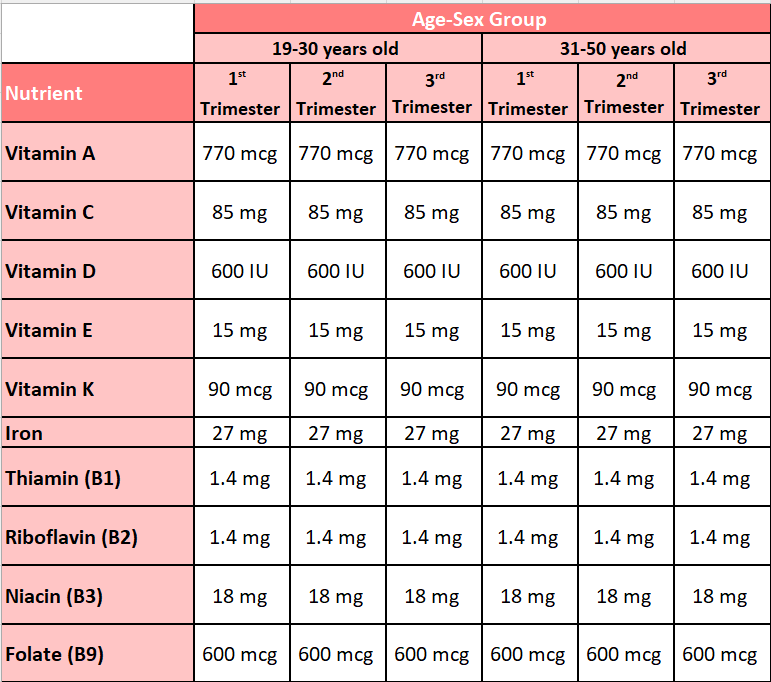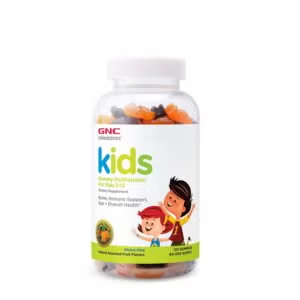
Has the mayhem of your busy schedule left you wondering whether you’re getting in all of the vitamins and minerals that your family needs? Are you looking for confidence when it comes to nutritional adequacy and the assurance of your family’s health? If so, adding a multivitamin to your daily routine could be a convenient and effective solution you’ve been looking for. As experts in the health and wellness space, our team of Registered Dietitians, Doctorate-Level Scientists, and academically trained nutritionists offer you scientifically validated information to help you succeed. Let’s dive right in!
What You Need to Know
- Multivitamins contain impactful blends of micronutrients that support immune function, energy production, athletic performance, healthy aging, and general health and wellness.
- Much of the United States population fail to meet their daily requirements for many essential nutrients that can be found in multivitamins.
- Age and sex are major determinants of vitamin and mineral needs. Understanding the Dietary Guidelines for Americans’ recommendations for micronutrient needs can help guide you to choosing the multivitamin that is right for you.
- We’ve compiled a list of the best multivitamins for each member of your family so that you don’t have to!
Related Reading: FOUR REASONS TO CHOOSE A GNC MULTIVITAMIN
Why Should You Take a Multivitamin?
Many of us have been told that taking a multivitamin is the “right” thing to do. But, why? Is it really contributing to my overall health? How are they working in my body? Do the nutrients included get absorbed or are they excreted in the toilet? While all common and valid questions, you’ll be glad to learn in the answers below that multivitamins truly do help to fill nutritional gaps in your diet and are effectively absorbed and utilized in the body.
Do Multivitamins Work?
Yes! A multivitamin is a nutrition supplement that contains an intentional combination of vitamins, dietary minerals, and other nutritional elements that are targeted specifically for immune support, energy production, athletic performance, healthy aging, or overall health and general wellbeing. Multivitamins offer impactful dietary support by contributing to your daily needs and supplementing nutritional gaps in your diet. You can think of multivitamins as “dietary insurance” when it comes to ensuring adequate consumption of essential vitamins and minerals. In other words, if you find that you and your family are struggling to get in the right mix of nutrients amidst hectic schedules and work-life balance, multivitamins have your back!
Are Multivitamins Good For You?
Yes! Multivitamin formulas leverage micronutrients, which are vitamins and minerals that your body needs to regulate physiological functioning of cells and organisms and, ultimately, support your vitality. They’re required to produce energy, enzymes, and hormones– all of which contribute to your quality of life and ability to manage a bustling lifestyle.
Should I Take a Multivitamin?
Yes! Why are multivitamins important? While micronutrients can be found in food, current data tells us that there is an astonishing number of people who are not meeting their daily needs with diet alone. Nutrients such as magnesium, calcium, potassium, iron, and vitamins A, D, and C are under-consumed by kids and adults in the United States with at least half of children globally having vitamin and mineral deficiencies.
94.3% of the United States population do not meet the daily requirement for vitamin D, 88.5% for vitamin E, 55.2% for magnesium, and 44.1% for calcium. Consequently, deficiencies can result in lethargy, weakened immune systems, suboptimal mental and physical performance. Taking a multivitamin can help you avoid or combat these dietary obstacles. [1, 2, 3]
How Long Should You Take Multivitamin Supplements?
Micronutrient deficiencies are relevant amongst all life stages and can result in feelings of fatigue, increased incidence of illness, and decreased physical and mental capacity. Though multivitamins cannot replace a healthy diet, their consistent daily intake throughout the lifespan can help your family meet their needs in an efficient, effective, and convenient way. There are a variety of multivitamin supplements available on the market today that are specified for different ages, so be sure to make the appropriate product transitions accordingly.[10]
When Should You Take Multivitamin?
When trying to optimize the absorption and effect of your multivitamin, it’s less about the time of day that you take the product and more about what you pair it with. Most multivitamins contain a mix of water- and fat-soluble vitamins, meaning that they require both water and fat to be absorbed in the body. Because of this, it’s recommended to take your multivitamin alongside a fat-containing meal or snack (whenever works for you!). [8]
For more information, check out this article: WHEN’S THE BEST TIME TO TAKE YOUR VITAMINS?
Why Does My Multivitamin Not Have an Expiration Date?
Unlike prescription drugs and over-the-counter medications, the U.S. Food and Drug Administration (FDA) doesn’t require vitamin and dietary supplement manufacturers to include an expiration date on the packaging, though you may see companies voluntarily including a “best before” or “use by” date printed on the product label. [9]
Who Benefits from a Multivitamin?
As age and sex results in variability in daily nutrient requirements, the first step to choosing the most efficacious multivitamin is to understand the unique nutrient needs of each family member.
The Dietary Guidelines for Americans provides advice on the amount of nutrients that are required to support overall health. It offers recommendations for all life stages by translating current science on diet and health into guidance that supports healthy eating patterns. The following tables highlight guidelines for select essential micronutrients by age group and sex. For a full list of nutrient recommendations, visit www.dietaryguidelines.gov.
Kids and Teens

Children need a variety of vitamins and minerals to grow healthy and strong. Vitamin D, iron, and zinc are of specific importance during childhood to support appropriate bone development, red blood cell optimization, and immune function. [5]
Adolescence is the second-fastest growth stage in life after infancy. In this period of growth spurts, there is an increased need for many of the nutrients included in the table above, namely calcium, iron, and vitamins A, C, and D. [6]
Adults and Older Adults

How often does the chaos of adulthood result in the minimized prioritization of your health and wellness? We can likely assume that your answer is, “all too often.” As seen in the previously shared data on micronutrient deficiencies nationwide, adults are generally missing the mark when it comes to ensuring adequate intake of essential vitamins and minerals.
When considering a men’s multivitamin, it’s important to know that adult males require more vitamin C, K, B1, B2, and B3. Alternatively, iron is of greatest concern in menstruating females, while older men and women should prioritize antioxidants, like vitamin A, C, and E, and bone-supporting nutrients, such as calcium and vitamin D, that promote healthy aging. [4, 6]
Pregnant Adults

Pregnant women have increased requirements for many micronutrients found in multivitamins considering greater blood volume, placental growth, and fetal development. Most notably, vitamins A, C, E and certain B vitamins, like folate, are of greatest importance in a prenatal multivitamin when minimizing risk of prenatal complications and supporting the rapid growth of mom and baby.
Do I Have to Take a Multivitamin That Is Specific to My Age and Gender?
As seen in the charts above, vitamin and mineral recommendations vary by age and gender, so it’s important to choose a multivitamin that offers you the individual support that you need. Some multivitamins are formulated with these discrepancies in mind to craft a product that can be used by a wide audience, while others are specifically designed for a certain consumer group, like kids, men, or women.
Types of Multivitamins
Multivitamins are available in a variety of formats to cater to individual needs and preferences. Young kids typically prefer flavorful gummy formats, while older adults may reach for liquids or powders if they have difficulty swallowing pills or dental restrictions. If you’re searching for a way to incorporate multivitamins into a delicious drink, consider a powder format that can be added to your daily shake. Head over to GNC’s Recipe page for inspiration!
Multivitamins for Men, Women and Kids
- Multivitamin Pills and Capsules: The traditional option, these vitamins are easy for most adults to swallow. They also don’t include a lot of sugar, unlike other types of multivitamins.
- Multivitamin Gummies: These soft, gummy vitamins come in different flavors, like mixed berry or citrus, offering fun sensory experiences that make them a great choice for kids!
Considerations When Taking a Multivitamin
Dietary supplements do have the potential to interact with certain medications or affect how medications work and are absorbed in the body. For example, certain drugs prescribed for heart disease are less effective when taken with St. John’s wort, an herbal supplement. When taking any supplement, it’s important to be in-tune with your body and consult with your medical provider if you have any questions or concerns. [11]
GNC’s Top Multivitamin Picks
Taking a multivitamin is a convenient way to improve your daily nutrient consumption. To optimize your convenience, we’ve compiled a list of the best multivitamins for each member of your family, so you don’t have to!
Multivitamins for Kids and Teens
Best Multivitamin For Kids 2-12:
GNC Multivitamin Gummy – Kids

GNC’s tasty Kids Chewable Multivitamin is a perfect, easy addition to your child’s daily routine. Formulated with 20 essential nutrients to support eye health, strong bones and teeth, immune functioning, energy production, and overall health and development, this multivitamin for kids is a no-brainer for parents everywhere.
Meeting your micronutrient needs is easy when you incorporate multivitamins into your daily routine. Their convenient delivery and comprehensive nutrient inclusions give you the assurance you’re looking for and the confidence you need to keep your family on track. It’s as simple as “add to cart!”.
Sources:
- The Hidden Hunger: Micronutrient Deficiencies (ifm.org)
- Micronutrient Facts | Nutrition | CDC
- Micronutrient Inadequacies in the US Population: an Overview | Linus Pauling Institute | Oregon State University
- Dietary Guidelines for Americans, 2020-2025
- Zinc | Nutrition | CDC
- Adolescent Nutrition | Childhood Development (cincinnatichildrens.org)
- Nutritional Requirements throughout the Life Cycle | Nutrition Guide for Clinicians (pcrm.org)
- The Best Time to Take Vitamins (clevelandclinic.org)
- Dietary Supplement Labeling Guide: Chapter I. General Dietary Supplement Labeling | FDA
- Micronutrient Deficiency Conditions: Global Health Issues | Public Health Reviews | Full Text (biomedcentral.com)
- Mixing Medications and Dietary Supplements Can Endanger Your Health | FDA









